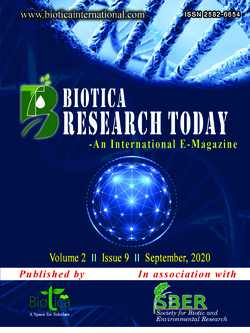
Profitable Integrated Farming System for Enhancing Income for Small and Marginal Farmers
R. Thangadurai*
Krishi Vigyan Kendra, Papparapatty, Dharmapuri, Tamil Nadu (636 809), India
P. S. Shanmugam
Dept. of Pulses, Tamil Nadu Agricultural University, Coimbatore, Tamil Nadu (641 003), India
M. A. Vennila
Krishi Vigyan Kendra, Papparapatty, Dharmapuri, Tamil Nadu (636 809), India
C. Sivakumar
Krishi Vigyan Kendra, Papparapatty, Dharmapuri, Tamil Nadu (636 809), India
DOI: NIL
Keywords: Economic, Enterprises, Farming, Integrated farming
Abstract
The farmers concentrate mainly on crop production which is subjected to a high degree of uncertainty in income and employment to the farmers. Integrated farming is defined as a biologically integrated system, which integrates natural resources in a regulated mechanism into farming activities to achieve maximum replacement of off-farm inputs and sustain farm income. An Integrated Farming System (IFS) helps farmers, especially small and marginal, to achieve maximum returns and income from different integrated components, thereby improving their standard of living. The IFS also acts as a means for providing nutritional security to a farmer’s family as the farmer is able to provide various IFS components such as vegetables, fruits, egg, milk, fish, etc.
Downloads
not found
Reference
Behera, U. K., Jha, K. P., & Mahapatra, I. C. (2004). Integrated management of available resources of the small and marginal farmers for generation of income and employment in eastern India. Crop Research, 27: 83–89.
Chand, R., Prasanna, P. A., & Singh, A. (2011). Farm size and productivity: Understanding the strengths of smallholders and improving their livelihoods. Economic and Political Weekly, 46: 26–27.
Channabasavanna, A. S., Biradar, D. P., Prabhudev, K. N., &Hegde, M. (2009). Development of profitable integrated farming system model for small and medium farmers of Tungabhadra project area of Karnataka. Karnataka Journal of Agricultural Science, 22:, 25–27.
